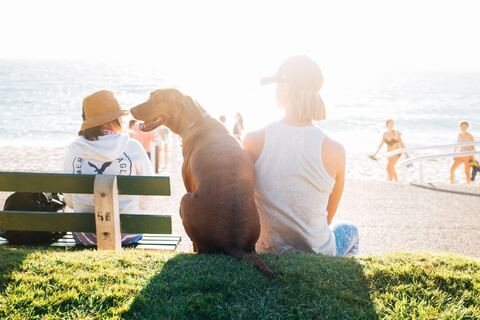|
It's the holiday season. It’s chaos time for everyone, and it feels like the end of the year is only accelerating as the end approaches. Family occasions are non-stop in the calendar, what seems like a million Christmas parties and organised catch ups before the New Year. We have to think about how we are going to look after the most important people in our lives, and our pets are a part of that.
With that time pressure turning up, dog trainers start to see an increase in behaviour enquiries - and it becomes really difficult to help when our time in the calendar is running out as well. Behaviours we see in our dogs, in the vacuum of the normal year, are manageable and aren’t at the forefront of our mind… However, with a sudden change of circumstances, with the new situations our dogs will be getting into, some pet guardians realise that there may be some disturbances if a behaviour problem isn't addressed. During the year, going away for the weekend is easy when your mum can come over and make sure Fido is fed and has company. Now that all your family are going away for a holiday together, the fact that he doesn’t do well in a kennel environment is somewhat of an issue. Not to mention how hard it is to find space if you don’t book their slot earlier in the year! When your mastiff comes in for a big hug after your work day in the form of jumping and putting their paws on your shoulder it’s pretty heartwarming. If they do it the first time Aunty Jean comes over on her trip from the UK, the fact that she’s shorter than him when he’s on his back legs, and is only used to corgi’s is going to give her a hell of a fright. It’s very likely they’ll both end up on the floor in a heap. Now people are reaching out, the ‘problems’ they’ve been dealing with are less manageable, and they have a deadline that they need the problem gone by. The dogs have been practising the behaviour all year without any interference, and they have no idea that the rules are about to change. The issue with this comes in that, well, changing behaviour doesn’t happen in one or two sessions. Getting a trainer does not immediately make a behaviour problem go away. We can’t even give an estimate on how long it will take. Training new behaviours takes a lot of time and commitment, and at the end of the year, people are even more time poor. For short term relief in some circumstances, there are often management strategies that’ll help with the stress of what your dog is doing, but this is usually for the behaviours that fall into the ‘inconvenience’ camp, rather than the more extreme ones. Putting your dog away when guests turn up so they don’t jump on them, or using enrichment activities to keep them busy - the management isn't usually too complex and quick to implement. Some of the behaviour enquiries coming in around this time of year do need much more complex training plans that have time estimates that reach into the ‘months’. If your dog has been barking and lunging at other dogs on lead since April, and you want them to be able to go to a Top 10 Holiday Park and settle nicely next to a neighbouring campervan with a strange new dog, we are going to have to have a conversation with some hard truths involved. When we get enquiries where the timeframe is simply unrealistic, we get to a point where before the initial meeting we try to express realistic outcomes. Often we advise them that we won’t be able to complete their expectations in the timeframe they set us. In some cases, we don’t even take the cases at all. If we cannot set the outcomes realistically, and the humans still try to reach goals that are unobtainable, then the dogs get put under extreme pressure, the humans get disappointed and everyone loses out. It’s not like we don’t understand where owners are coming from. It’s a safety thing, and a dog ‘misbehaving’ in a group setting causes feelings of embarrassment and stress. It’s just unfortunate that waiting until the last minute to train is going to be a hard lesson in why procrastination is not the path to success. Human behaviour is a tricky one, and hindsight is the most frustrating. I can relate from my university days in finishing assignments only as the deadline approached, telling myself that ‘diamonds are made under pressure’. The fact of the matter is that is not a mantra to follow, and it’s certainly not something to rely on if you’re trying to change a dog’s skill set. It’s not too late, if you realise that there are things you need to work on with your pooch. We do think you should still reach out for help - a professional may be able to give you those management and safety strategies to get you through the holiday period. But we may also let you know that the true training process will have to properly start in the New Year, when you are feeling fresh, ready, and have enough time to truly dedicate yourself to the process. You AND your dog will be thankful to not have the time pressure looming over your head. Authored by Sarah Endres Dog Trainer and Behaviour Advisor
0 Comments
Leave a Reply. |
AuthorsArticles created by the team at Allsorts Dog Training, Bay of Plenty, New Zealand Our Library
All
|


 RSS Feed
RSS Feed